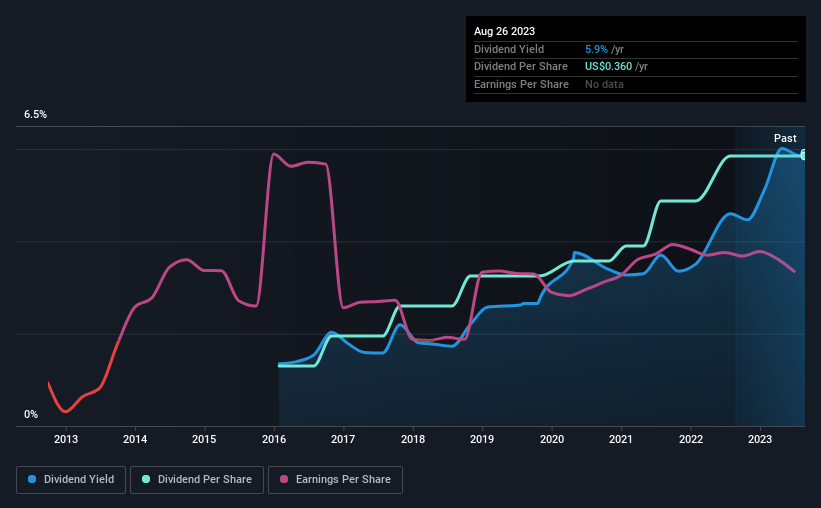Is It Smart To Buy FNCB Bancorp, Inc. (NASDAQ:FNCB) Before It Goes Ex-Dividend?
It looks like FNCB Bancorp, Inc. (NASDAQ:FNCB) is about to go ex-dividend in the next four days. The ex-dividend date is one business day before the record date, which is the cut-off date for shareholders to be present on the company's books to be eligible for a dividend payment. The ex-dividend date is important because any transaction on a stock needs to have been settled before the record date in order to be eligible for a dividend. Meaning, you will need to purchase FNCB Bancorp's shares before the 31st of August to receive the dividend, which will be paid on the 15th of September.
The company's next dividend payment will be US$0.09 per share. Last year, in total, the company distributed US$0.36 to shareholders. Based on the last year's worth of payments, FNCB Bancorp stock has a trailing yield of around 5.9% on the current share price of $6.09. If you buy this business for its dividend, you should have an idea of whether FNCB Bancorp's dividend is reliable and sustainable. That's why we should always check whether the dividend payments appear sustainable, and if the company is growing.
See our latest analysis for FNCB Bancorp
Dividends are typically paid from company earnings. If a company pays more in dividends than it earned in profit, then the dividend could be unsustainable. That's why it's good to see FNCB Bancorp paying out a modest 45% of its earnings.
Generally speaking, the lower a company's payout ratios, the more resilient its dividend usually is.
Click here to see how much of its profit FNCB Bancorp paid out over the last 12 months.
Have Earnings And Dividends Been Growing?
Companies with consistently growing earnings per share generally make the best dividend stocks, as they usually find it easier to grow dividends per share. If earnings decline and the company is forced to cut its dividend, investors could watch the value of their investment go up in smoke. It's encouraging to see FNCB Bancorp has grown its earnings rapidly, up 147% a year for the past five years.
Another key way to measure a company's dividend prospects is by measuring its historical rate of dividend growth. FNCB Bancorp has delivered 24% dividend growth per year on average over the past seven years. It's exciting to see that both earnings and dividends per share have grown rapidly over the past few years.
Final Takeaway
Is FNCB Bancorp worth buying for its dividend? When companies are growing rapidly and retaining a majority of the profits within the business, it's usually a sign that reinvesting earnings creates more value than paying dividends to shareholders. Perhaps even more importantly - this can sometimes signal management is focused on the long term future of the business. FNCB Bancorp ticks a lot of boxes for us from a dividend perspective, and we think these characteristics should mark the company as deserving of further attention.
While it's tempting to invest in FNCB Bancorp for the dividends alone, you should always be mindful of the risks involved. Our analysis shows 1 warning sign for FNCB Bancorp and you should be aware of it before buying any shares.
If you're in the market for strong dividend payers, we recommend checking our selection of top dividend stocks.
Have feedback on this article? Concerned about the content? Get in touch with us directly. Alternatively, email editorial-team (at) simplywallst.com.
This article by Simply Wall St is general in nature. We provide commentary based on historical data and analyst forecasts only using an unbiased methodology and our articles are not intended to be financial advice. It does not constitute a recommendation to buy or sell any stock, and does not take account of your objectives, or your financial situation. We aim to bring you long-term focused analysis driven by fundamental data. Note that our analysis may not factor in the latest price-sensitive company announcements or qualitative material. Simply Wall St has no position in any stocks mentioned.

